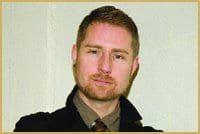Vancouver’s gay men’s resource program has been thrown into a state of flux by the departure of its director, Phillip Banks, and several staff members and volunteers.
Launched in August 2003 to promote gay men’s health as a whole, Gayway continues to be run as a program of AIDS Vancouver — at least for now. Banks, who has been with AIDS Vancouver for more than 12 years, ran the program until December, when he left his post as director of HIV prevention services to pursue new projects.
Under Banks’ leadership, Gayway moved from a small office on Davie St to a two-floor space on Helmcken last spring.
“I think it’s safe to say Gayway exists largely because of Phillip Banks’ drive and commitment,” says AIDS Vancouver executive director William Booth. “It’s largely to his credit that the program existed, due to his tenacity.”
“I started there when I was 24 and it’s been my only significant job in a career sense for 12-and-a-half years,” says Banks. “I stayed because it’s a well-respected organization that offered me the opportunity for career growth.”
However, Banks says after a dozen years, there was no room left for him to grow within AIDS Vancouver.
“It’s more about the fact that I’m not sure there is much more I can do in the realm of things I want to do,” Banks says.
Lately, Banks’ passion has publicly turned to creating an independent, holistic gay men’s health organization in Vancouver.
“It’s not just the right time for me, it’s the right time with a convergence of influences. The context is there for men’s health and wellness issues,” says Banks, citing potential funding for such an organization as a major positive factor.
He told the Gay Men’s Health Summit last November he’d like to see more gay-men specific health organizations in Canada. Later that same month, Banks called for “a new, stand-alone gay men’s health organization” in Vancouver.
“With gay men’s health needs expanding beyond the mandate of AIDS organizations, existing groups may not be well suited to adequately address gay men’s interests today,” Banks wrote in a guest column in Xtra West.
Enter the new non-profit organization called Health Initiative for Men (HIM), which was incorporated on Dec 5, confirms its chair, Carl Bognar. Until the creation of HIM, the only gay-men specific health organization in Canada was Sero-Zero in Montreal, though it deals specifically with HIV.
Bognar says some members of the HIM board of directors have been discussing the project for the last decade.
The new organization will approach gay men’s health as a whole — not just illness. Over the course of the HIV epidemic, Bognar says “it’s become obvious” that all the problems gay men face health-wise, not just HIV, “result from the same factors,” the biggest factor being homophobia, along with alcoholism, drug abuse and depression.
Rather than deal with individual health issues and illnesses, HIM will aim to address the underlying factors leading to them.
Though Banks is not officially involved with HIM at this point, Bognar says “we have a great respect for Phillip’s work and see him as a leader as far as gay men’s health is concerned.
“We have discussed with him what the possibilities are, but he’s not on the board. There’s no money so we can’t hire staff at this point,” Bognar explains.
“I’m a free agent now. I am assisting the [HIM] board in the development of this organization. But it’s in a volunteer capacity, it’s unpaid,” Banks confirms.
However, some people expect Banks will eventually be brought on to help lead HIM.
“I think there’s an understanding he’ll be director of this entity,” Booth predicts.
Banks admits he’ll be disappointed if he doesn’t eventually get to play an official role with HIM. “I want to be involved. How will depend on what the organization ends up looking like. What do gay men want?” Banks muses.
So far, all parties involved insist Banks’ AIDS Vancouver departure and unofficial involvement with HIM has been amicable.
“He’s perfectly welcome here [at AIDS Vancouver]. I have a large respect for Phillip,” says Booth.
Banks notes that other organizations such as the Asian Society for the Intervention of AIDS (ASIA) and the BC Persons with AIDS Society (BCPWA) are also offshoots of AIDS Vancouver and continue to enjoy a good working relationship with the 25-year-old organization.
AIDS Vancouver and HIM are currently in talks to see if Gayway could be a joint venture between them, or possibly be absorbed and entirely run by HIM.
“Our respective boards are meeting to discuss our roles and responsibilities. We don’t want to duplicate our efforts,” says Booth. “Gayway, as a stand-alone entity, some of it may be folded with HIM. We are looking at the options.”
Banks likens the situation to having a roommate move out and dividing up the household goods. Whatever the outcome, Banks predicts, “I think it will be pleasant. I’m not trying to be Pollyanna, I’m seeing that that’s the way it is right now.”
However, several Gayway staff members and volunteers have reportedly left since Banks’ departure.
“I have heard people are leaving,” Banks acknowledges. But that’s only natural, he says. “When I took over, volunteers left, but at the same time, new volunteers came on. People become very attached to people,” Banks remarks.
“I don’t think there’s been more of an exodus since Phillips left,” says Booth, adding that if any volunteers did leave he expects they’ll return soon.
“We place a very high value on volunteers. If there was a mass exodus, we would move very quickly to fix that,” Booth says.

 Why you can trust Xtra
Why you can trust Xtra


